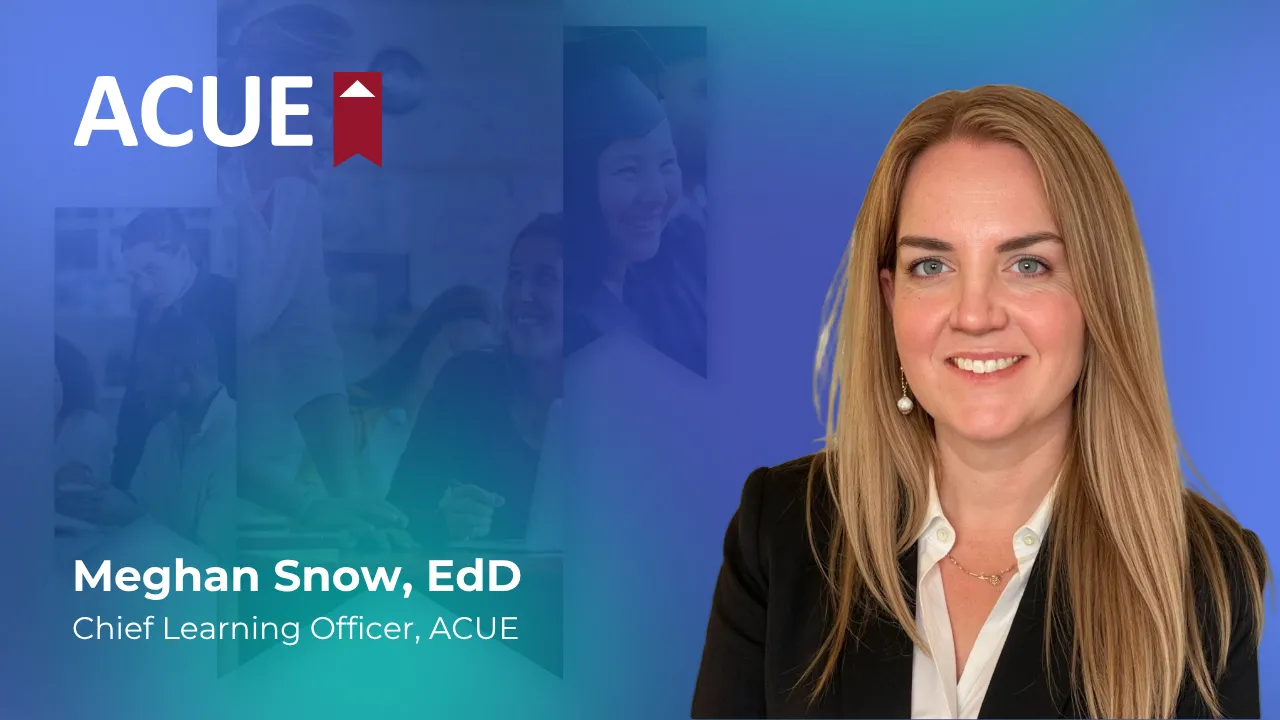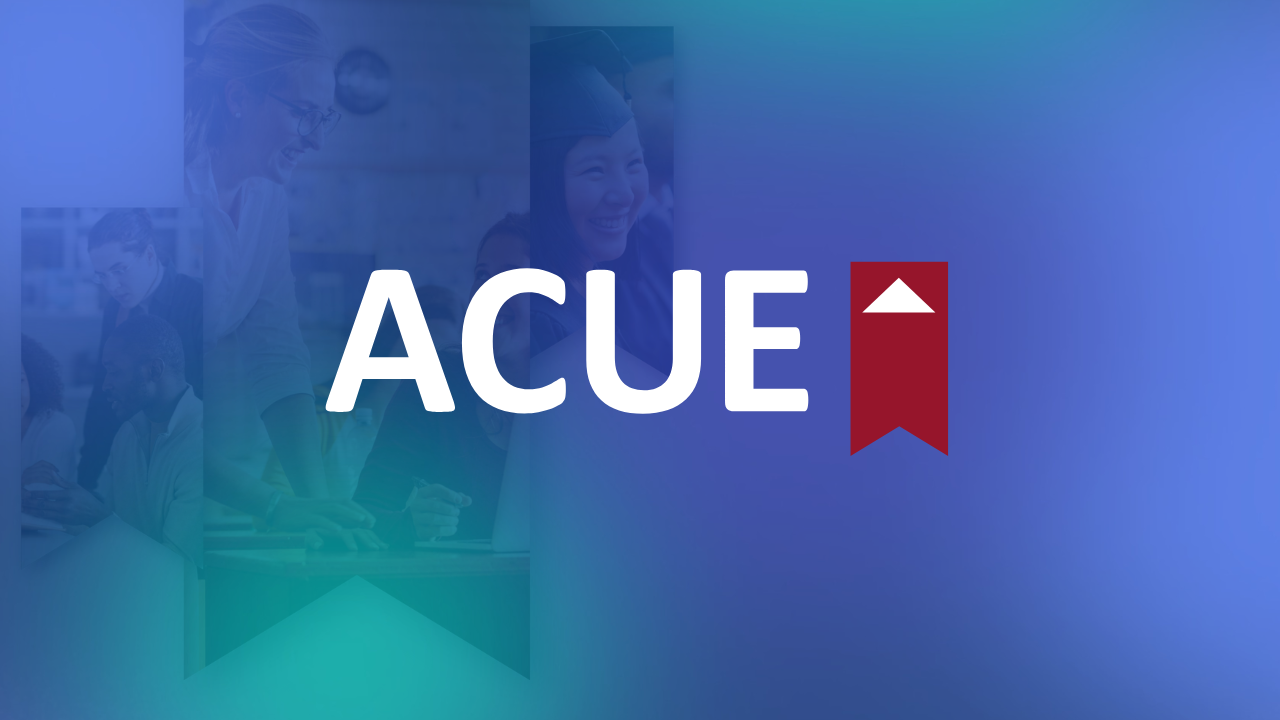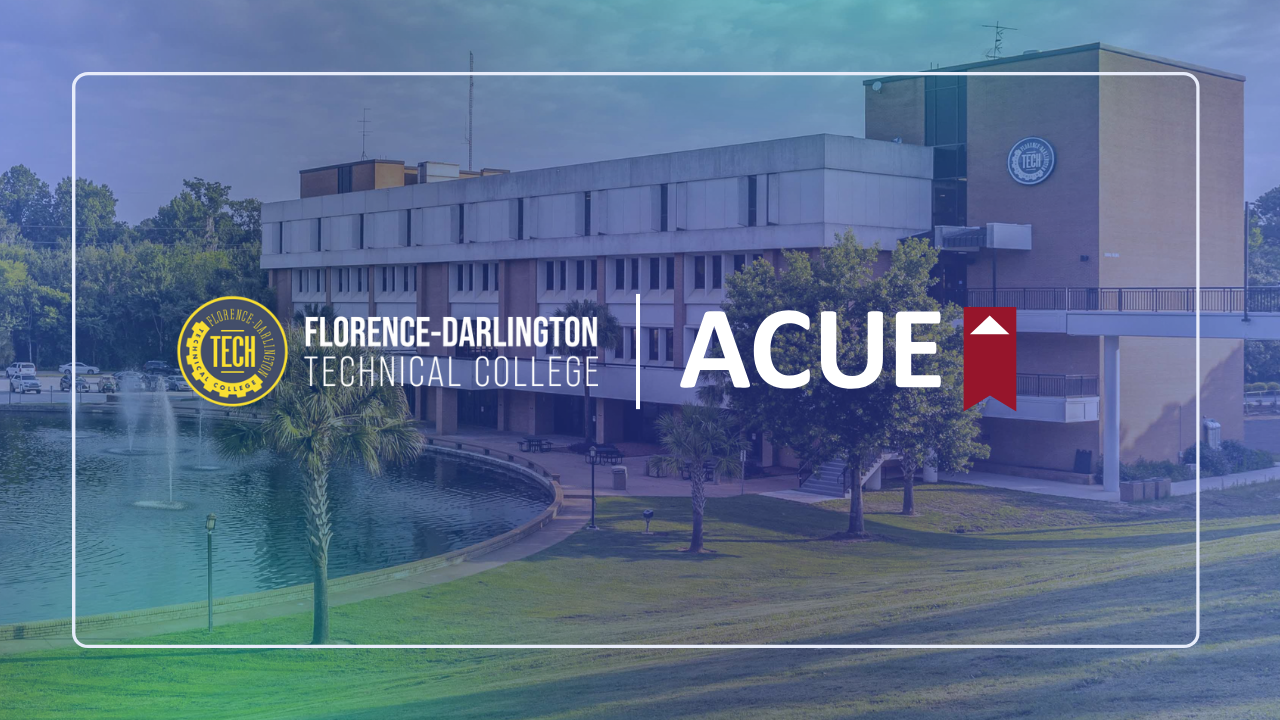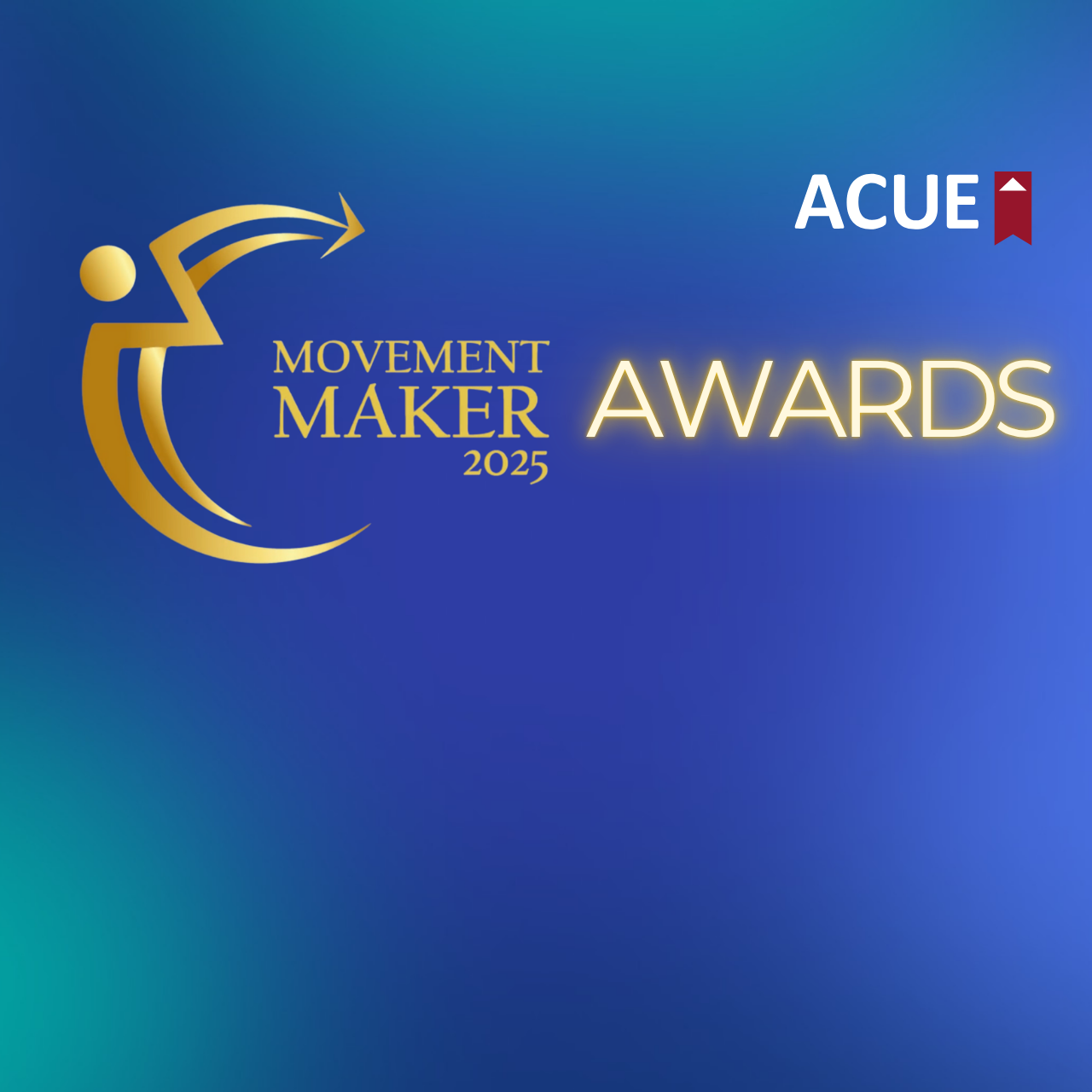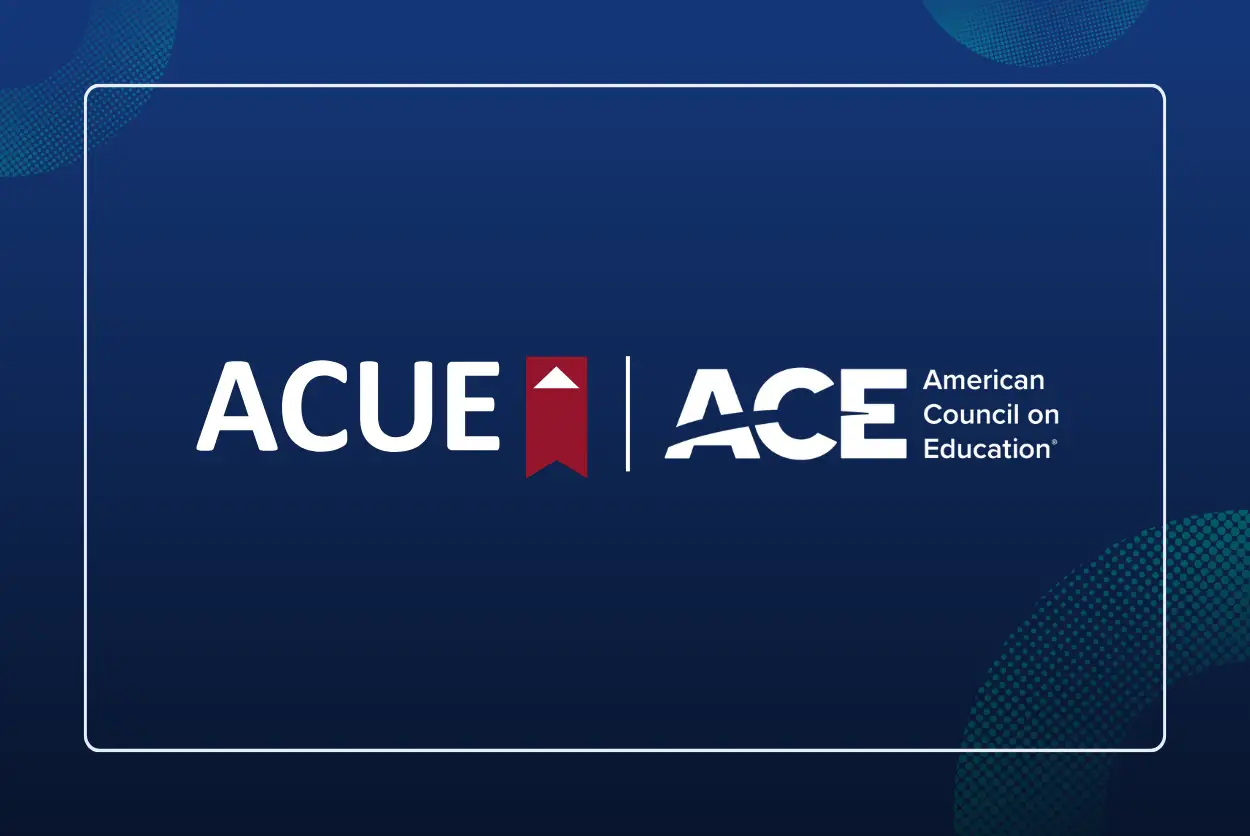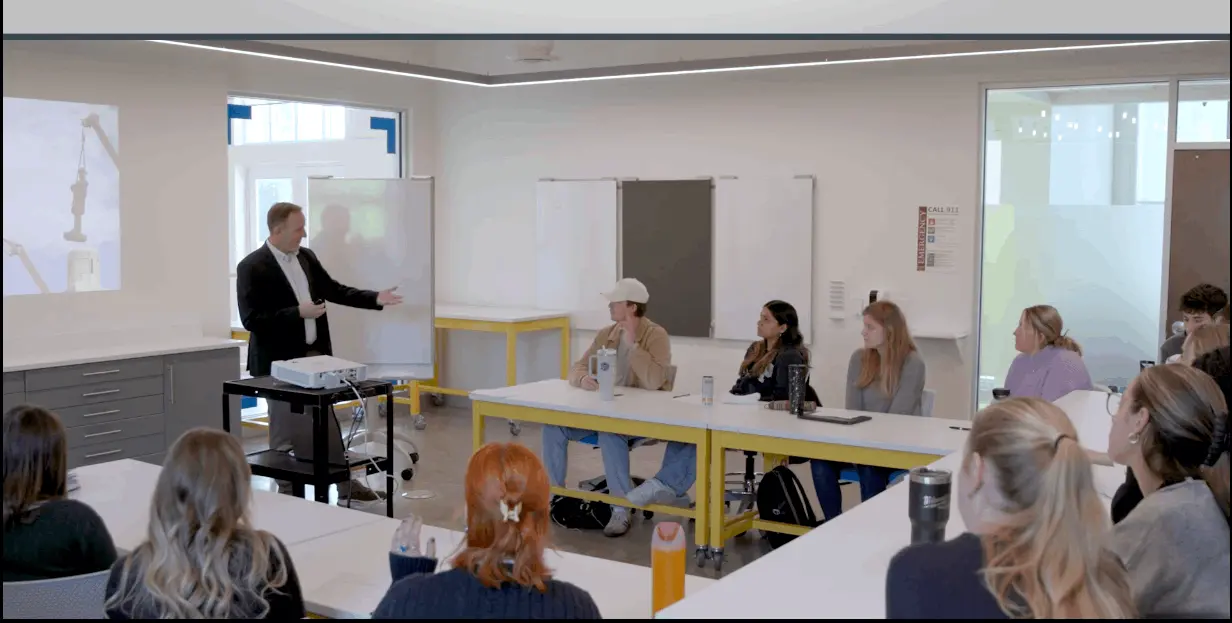For more than a decade, ACUE has partnered with colleges and universities to empower faculty to drive student success. Rooted in collaboration, research, and continuous improvement based on university feedback, Meghan Snow, EdD, ACUE’s inaugural Chief Learning Officer, brings a unique vision to continuing the evolution of ACUE and its innovative offerings.
We sat down with Dr. Snow to reflect on her journey, ACUE’s continued impact, and the importance of deepening partnerships in shaping the future of higher education.
Leadership and Vision in Higher Education
Q: As Chief Learning Officer at ACUE, what does your role entail?
Meghan Snow, EdD: My responsibility is to develop and deliver transformative learning experiences for faculty that move the needle for students and institutions. At its core, my role is to ensure that everything ACUE delivers contributes to stronger teaching and measurable student success.
Q: Can you describe the Academic and Content teams at ACUE?
Snow: Absolutely. Our Content and Learning Innovation team is led by Julie Candio Sekel, EdD. The Content and Learning Innovation team ensures we stay ahead of what faculty need by creating and curating resources, managing course production, and meeting the high standards for our certification courses.
Our Faculty Success team, led by Laurie Pendleton, EdD, works closely with partner colleges and universities to recruit, engage, and support faculty—to guarantee successful implementation and long-term impact of ACUE’s offerings.
At ACUE, collaboration is at the heart of everything we do. My teams work in close partnership to ensure we consistently meet and exceed the needs of our partners and their faculty. The Academic and Content teams collaborate closely with the Research Team, led by Elizabeth Lawner, PhD, and the Product and Technology Team, led by Elena Agibalova—all of which form the learning engine that powers ACUE’s mission.
Q: What brought you to ACUE, and what excites you most about your work?
Snow: My career began in K–12 as a middle school science teacher through Teach For America. I later served as a district administrator and ultimately as Director of STEM Education for the New Jersey Department of Education before joining ACUE in 2015.
What excites me most is the opportunity to improve student success. Time and again, students point to a single professor who changed their trajectory. At ACUE, we’re helping faculty make transformative experiences possible for every student.
“At ACUE, we’re helping faculty make transformative experiences possible for every student.”
—Meghan Snow, EdD
Academic Excellence and Student Outcomes
Q: What are some of the biggest challenges to improving academic excellence in higher education?
Snow: There are many—from funding to public perceptions of higher education. But our focus is on what happens in classrooms every single day. By equipping faculty with evidence-based teaching practices, we can directly impact student learning and outcomes where it matters most.
Q: How does ACUE’s Effective Teaching Framework support this mission?
Snow: When ACUE was founded, higher education lacked a clear statement of what faculty needed to know to teach effectively. We worked with experts and institutions to define the foundational knowledge and skills of teaching in higher education that ultimately became our framework—five core competencies that outline the essentials of great teaching. It provides a common language and comprehensive pathway for faculty development.
Q: How have ACUE’s offerings evolved over the past decade?
Snow: We survey our partners and faculty every year and use that feedback to adapt our offerings—better supporting our partners and improving transformative outcomes. These insights enabled us to recognize opportunities at an early stage.
Beyond annual surveys, we gather feedback continuously. We monitor course performance, collect input directly within our courses, and meet regularly with partners to understand their experiences and incorporate their perspectives throughout every stage of the program.
ACUE’s foundational certification course, Effective Teaching Practices, consisted of 25 learning modules with over 200 evidence-based practices faculty could learn and implement in their in-person courses to positively impact student outcomes. Faculty who completed this course earned their Certification in Effective Teaching, a first-of-its-kind certification endorsed by the American Council on Education. As colleges and universities began to offer more courses online, especially amidst the COVID-19 pandemic, we developed Effective Online Teaching Practices, a second certification course built on our same tried-and-true Framework which represents the knowledge and skills every college educator needs to be successful. Faculty who complete both certification courses earn our Advanced Certification in Effective Teaching, recognizing their formal training and proficiency in teaching across modalities.
I think of our certifications like college degrees. They’re intensive studies that, after completion, demonstrate that faculty have a solid foundation in teaching to enhance student performance and outcomes. Our faculty development programs draw on more than 50 years of research and emphasize reflective practice, empowering faculty to apply what they learn in real time.
Since the launch of our core programs, ACUE has expanded our offerings to include Quick Studies, short self-paced learning experiences addressing timely topics like AI, student well-being, and career readiness. I think of Quick Studies as continuing education.
Then, there’s ACUE Commons, a dynamic online community designed to give faculty the tools to continue to hone their professional development. In the Commons, faculty can easily access our entire library of Quick Studies and other resources.
Together, ACUE’s offerings scale a culture of teaching excellence while meeting partners’ emerging needs.
Q: How does ACUE foster collaboration and professional learning communities?
Snow: Collaboration is essential. That’s why we launched ACUE Commons. At the core, ACUE Commons is a vibrant global community where educators across institutions and disciplines connect to share strategies, learn from challenges, and exchange innovative ideas. For a more tailored experience, Commons also offers private groups that foster collaboration among faculty, helping to cultivate a strong, cohesive teaching culture within their specific campuses. Faculty can collaborate within their institution or engage with peers across the country. Our goal is to create sustained networks of support that reinforce student-focused teaching.
Q: What is ACUE Complete?
Snow: ACUE Complete is our comprehensive faculty development solution for colleges and universities. It unlocks everything that ACUE has to offer, including ACUE Commons, the Foundations of Effective Teaching Certificate programs, Quick Studies, and more. Whether you’re a graduate assistant, adjunct, or tenured professor, ACUE Complete offers resources for all faculty at any stage of their career.
Q: How does ACUE Complete help our partners scale their faculty and student success efforts?
Snow: That’s the essence of ACUE Complete. Through our surveys and conversations, we found colleges and universities loved ACUE’s offerings but wanted a more holistic way to scale their efforts. ACUE Complete delivers that—faculty development for every educator, at every stage, across their entire institution. And it works for colleges and universities of any size.
Partnerships and Innovation in Higher Education
Q: ACUE recently reaffirmed its partnership with the American Council on Education (ACE). What does this mean?
Snow: Through collaboration and advocacy, ACE provides a united vision for the future of higher education in the United States. Nearly a decade ago, ACE endorsed our Effective Teaching Framework, which validated the quality of our work. After more than a decade, reaffirming that partnership is a recommitment that underscores our shared mission to support institutions and advance student success.
Q: ACUE has also partnered with technology-focused organizations like Turnitin. How do these content partnerships strengthen your impact?
Snow: We’ve always valued partnerships that allow us to better serve our institutions. With Turnitin, for example, we’re engaging faculty around the evolving role of AI in higher education. Many faculty are just beginning to understand what AI means for their work and how to guide students using these tools. They are learning how to engage students who are using these tools. It changes the conversation and the way you talk to students about what they’re learning and the value of learning.
Even when we initially launched the Quick Studies focused on AI nearly two years ago, we knew faculty would need additional tools to support them in maintaining educational standards and integrity.
Content partnerships like the one with Turnitin combine world-class instructional design with emerging tools and expertise, helping faculty and students thrive in a rapidly changing environment.
